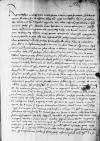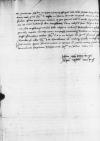Heri ad vesperam oblatae sunt mihi iucundissimae litterae immo gratissima litterarum volumina a Reverendissima Dominatione Vestra, quorum argumenta dum obiter inspicerem, mox, sepositis reliquis, ⌊⌋ attentiore animo legendam in manus assumo. Primum expungo nomen auctoris, meumque optimo iure repono. Atque Deinde ante divinum tribunal me ipsum reum constituo atque audacter accuso, peccata aperio nihil celans, nihil negans, securus de venia, quando ex puro corde tam vehementem filii prodigi orationem coram clementissimo iudice peroravero. Nullae enim oratoriae partes, quibus ille summus iudex ad misericordiam flecti solet, in ea desiderantur. Profecto non erat tam facile Hortensio atque paper damaged⌈[tque paper damaged, possibly ut⌈tquetque paper damaged, possibly ut⌉]tque paper damaged⌉ Ciceroni, eloquentissimis hominibus, suos caesares aut alios iudices in favorem reorum inclinare, quam facile clementissimus Deus suum prodigum filium, nudum, famelicum, saucium atque omni ex parte desolatum recipiet, quando factorum poenitens tam suavissima poenitentiae carmina secum attulerit. Itaque fateor me spirituale aliquod gaudium et ineffabile per ea ipsa ⌊⌋ consecutum, nihilque dubito, quin ipse Divinus Spiritus (cuius vehementiam in eis miror et veneror) maiora et meliora cum ipsorum scriptore prope diem faciat. Redeunt mihi in memoriam ⌊Sancti Augustini episcopi⌋ Confessiones, ⌊Ambrosii⌋ conversio, Hieronimi flagella et similia sanctissimorum pontificum exempla, quibus Reverendissima Dominatio Vestra in saecularibus litteris et magna huius mundi opinione hactenus similis fuerat. Quocirca iam in animo confirmata id, quod ipsi ad aetatem vergentes et pontifices constituti fecerint, imitari stud written over b⌈bdd written over b⌉ebit. Tantum ex tempore ad memorabiles ⌊⌋.
Nunc ad ⌊⌋ illius iucundissimae amicitiae, quae contracta et diu conservata fuerat inter Reverendissimam Dominationem Vestram et magnificum ⌊Cornelium Dupplicium⌋ etc. Quid hic dicam, nisi quod utrique gratuler et me tertium fieri exoptem? Quod si assecutus fuero, non parum commodi meae futurae felicitati accessisse putabo. Talis quippe et tam ingens est moles negotiorum meorum, ut undique fidos amicos et diligentes cooperatores circumspicere debeam, magnaque et certa spe ducor de magna virtute et excellenti ingenio Reverendissimae Dominationis Vestrae. Quae si dignata fuerit aliquam partem curarum mearum mecum suscipere, nequaquam dubitet, quin suis maximis et praeclarissimis retroactae vitae operibus maximum splendorem adiiciat, simulque Deo immortali (pro cuius honore et amore multos duros labores sustineo) gratissimum exhibebit obsequium.
Tandem ad gratissimas litteras Reverendissme Dominationis Vestrae mihi inscriptas descendo, in quarum fronte considero, quam gratum fuerit Reverendissimae Dominationi Vestrae me gratam memoriam contractae inter nos amicitiae apud reverendissimum dominum promotorem nostrum ⌊archiepiscopum Gnesnensem⌋ fecisse. Feci, quod potui et debui, attendens, quod nullum officium referenda gratia magis necessarium sit in humano convictu, et si modo imitari possem agros fertiles, qui plus dant, quam acceperunt, non verbis sed factis gratiam referrem. Quod autem Reverendissima Dominatio Vestra se  AAWO, AB, D. 3, f. 110v tam humaniter exhibet in vota mea, res est, quam toto corde exopto, atque ob id deliberare volo, quid Reverendissima Dominatio Vestra in futuro conventu nuptiali ⌊Cracoviae⌋ pro me faciliter efficere queat, quae interim et per primum nuntium mihi significare dignetur, an certum habeat se illuc transituram written over ...⌈... illegible⌈...... illegible⌉situramsituram written over ...⌉.
AAWO, AB, D. 3, f. 110v tam humaniter exhibet in vota mea, res est, quam toto corde exopto, atque ob id deliberare volo, quid Reverendissima Dominatio Vestra in futuro conventu nuptiali ⌊Cracoviae⌋ pro me faciliter efficere queat, quae interim et per primum nuntium mihi significare dignetur, an certum habeat se illuc transituram written over ...⌈... illegible⌈...... illegible⌉situramsituram written over ...⌉.
Nova nobiscum sunt ⌊regem⌋ ⌊Sveciae⌋ cum suis confederatis navali bello classem Lubicen(sium) or Lubicen(sem)⌈Lubicen(sium)Lubicen(sium) or Lubicen(sem)⌉ devicisse, eamque (diffugientibus turpiter nautis) totam occupasse atrociterque victoria in reliquos usum fuisse.
Felicissime valeat Reverendissima Dominatio Vestra et me diligat, cum ego eam plurimum amem. Commendat se eidem Reverendissimae Dominationi Vestrae cancellarius noster, mittitque praesentibus inclusa carmina. Salutentur optime feminae ⌊mater⌋ et sorores cum ceteris amicis, quorum memoriam benevolentia sempiterna prosequemur.
 AAWO, AB, D. 3, f. 110v tam humaniter exhibet in vota mea, res est, quam toto corde exopto, atque ob id deliberare volo, quid Reverendissima Dominatio Vestra in futuro conventu nuptiali
AAWO, AB, D. 3, f. 110v tam humaniter exhibet in vota mea, res est, quam toto corde exopto, atque ob id deliberare volo, quid Reverendissima Dominatio Vestra in futuro conventu nuptiali 

